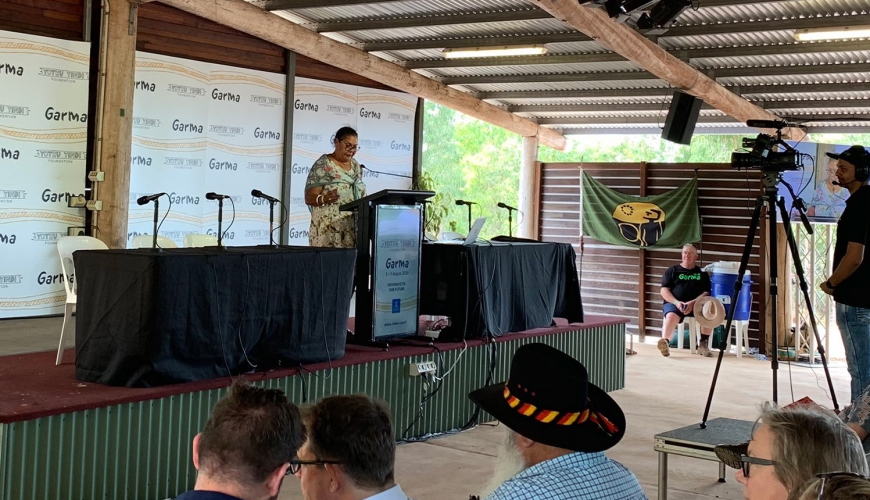Garma: Voices speech

Aboriginal and Torres Strait Islander Social Justice Commissioner June Oscar AO addressed Garma in the Northern Territory on August 3. The topic was 'Voices'.
Jalangurru lanygu balangarri. Yaningi yatharra ngindaji yuwa muwayi ingirranggu, Gumatj, Yolngu yani U.
Galwurruy, djawa, Djapirri and your family thank you for hosting us.
I acknowledge the Yolngu Gamatji people of the land we gather on today, and all the clan groups of Arnhem land and surrounds. I pay my deep respects to your elder’s past, present and emerging. A big thank you and congratulations to the Yothu Yindi Foundation, to Denise and to the many other Yolngu people, families and communities who would have worked tirelessly to bring this incredible festival together.
Djawa, thank you for reminding us that we each have a right to our voices and we acknowledge that they come from our diverse lived experiences.
Thank you to my fellow speakers in this session, the honourable Mr Ken Wyatt, Ms Pat Turner AM and Professor Mick Dodson AM. Without fail, each of you always interrogates the norms of how our governments and institutions work with our peoples. You remind us that what we are working toward is what we deserve, and we have no choice, but to get there.
Thank you for your leadership.
The standard of working relationship with governments and other decision-makers should always be to have Aboriginal and Torres Strait Islander people at the table as equal partners.
We know the importance of enshrining and integrating our voices into the foundational document and the policy and legislative structures of this nation. Without guarantee of our equal worth and voice to non-indigenous peoples, our rights to:
- self-determine our existence in this nation;
- develop institutions and governance structures to support our social, cultural and economic practices, and;
- assert our deep connection and belonging to place can too easily be dismissed with the stroke of a pen.
Structural reform is essential to making sure our voices are always present. I also firmly believe that our voices, from the ground-up, are necessary in decision-making spaces to inform working practices, institutions, and policy that are more innovative, caring, compassionate and enabling for our peoples. To do this we need to listen deeply with purposeful intent to our Aboriginal and Torres Strait Islander voices. Change happens, we introduce and implement reforms, when what we hear alters the ways in which we think about the world around us and necessitates that we act and do our work differently.
As the first woman to be appointed to the role of the Aboriginal and Torres Strait Islander Social Justice Commissioner at the Australian Human Rights Commission, I am committed to truly listening, understanding and responding effectively to our women and girls’ voices and all our peoples.
This is the central priority of my term.
In 2017, the first thing I did as the Social Justice Commissioner was to say to our Aboriginal and Torres Strait Islander women and girls: your voice matters, and you have a right to your voice. Let no one ignore or silence you.
When I launched the Wiyi Yani U Thangani project, meaning Women’s Voices in my language Bunuba. In December 2017 my team and I travelled to every state and territory. We went with no set agenda, or imposed framework. Our women and girls set the tone and determined the conversation.
It has been 33 years, in the days of DAA, since the Women’s Business engagements, the first and only time our voices have been heard as a collective.
In 2019, it is time to hear us again. Toward the end of this year, we will hand to Parliament all of what our women and girls have said. All of our strengths, issues, solutions and the future we want, a future self-determined by us.
There is no better place and gathering to listen deeply and consider the power and potential of our Voices than here at Garma. Here, Yolngu voices have asserted their unique cultural, social, economic and political realities. This shows us how our voices can contribute to Indigenous nation-building and forming institutions and organisations based on our knowledge, that teaches our knowledge to our peoples and to others.
Our voices have never been passive. Voice constructs our societies. This is how it has been for us since the beginning of time, when voice sang the country into being, and our languages continue to speak the lore of the land. The lore gives us clear protocols and obligations for how to behave and interact and carry a collective and intergenerational responsibility to care and protect each other and our country. These are the frameworks of our nationhood.
We cannot underestimate the vital ecological and societal knowledge contained within our voices, and what it can bring to all decision-making that affects our lives and the future of this nation-state.
This is what I know and have heard from our women.
Women have spoken to me of needing a system that supports a holistic way of living where education, regional economies, jobs, housing, childcare and mental, spiritual and physical health are all interconnected, while informed and grounded in our culture and lived realities.
But, as you all well know, the approach to work is segmented and siloed and operates free of our lived realities and contexts. Our women have told us: This cannot go on. We cannot maintain the current policy-making practice of top-down decision-making, and vague consultations, where hearing our voices is no more than a token gesture, a tick-the-box exercise to squeeze our lives into governments rigid agendas.
A system that fails to hear us and see us, fundamentally fails us.
It is counter to our basic rights of self-determination, participation and free, prior and informed consent.
This system is incapable of meeting our needs. Our basic rights to things like adequate housing, food, education, health, financial security, and our rights to land and country are not being guaranteed. It is these conditions of poverty that perpetuates intergenerational traumas and all forms of inequalities. A significant theme that has emerged from the engagements and cuts across all of these issue areas is the pervasiveness of direct and institutional racism and structural discrimination.
These conditions become a vicious cycle in our lives. The same system that has failed to provide the necessary support comes to frame us in the deficit, as if we are an ‘issue’ a ‘problem to be solved’. Investments are weighted toward crisis interventions and institutional response, instead of prevention programs and initiatives and supportive pathways to enable our women to be heard and have the lives they want and deserve.
At this point in time, with the evidence at hand, and our voices singing out loud and clear, we need to put an end to governments, policy-makers and bureaucrats thinking they know our lives better than we do. They don’t. How can someone who does not live in our reality know what is best for us?
That is why when we release Wiyi Yani U Thangani we will be calling for reforms that respond to what our women have said, that to be truly self-determining, while rectifying injustices and disadvantage in our lives, we must be at every decision-making table, and our voices must be central to designing policy and legislation. How many more reports will it take? This acceptance of crisis caused by the system, not us, has to end. It must end now.
To effectively respond to the systemic issues women have spoken we have to break the cycle of inequality and interventions. The system has to be flipped from crisis to prevention investment. We will also be asking that Australian Governments at the Federal, State and local levels to change ways of working so that processes, programs and services are community-led, strengths-based, and trauma-informed.
And at every stage of reform we need strong co-design processes that are grounded in practices of deep listening – where decision-makers engage in true and equal partnership with us.
It is in spaces like this, here at Garma, that I can see how co-design can truly take effect. Here, we can sit as equals in genuine dialogue with governments, those from the private corporate sector and other groups, to have the robust and challenging conversations needed about the ways forward and share thoughts and ideas as part of dynamic, and as I call it, Nations to nation dialogue.
This is how we need to respond to Wiyi Yani U Thangani when it is released. The report like our voices will not be passive. It will be a starting point to build constructively from. It is certainly not another moment to let settle, isolated, a closed book.
Our women’s voices demand a response. When we embark on stage two of Wiyi Yani U Yhangani, my team and I will look toward working with our peoples, and others across all levels of government and sectors. Together, with many of you by our side, we will need to do this work in a genuine deep listening and responsive partnership.
Rawurra milawarra nginjadima wadgirli mantha yarranga yawu, Burridi ngarri yathawarra, yarrangi ngarri thangani junbawayingindaji nhingi banda.
As Djawa reminded us with all our voices Indigenous and non-Indigenous supporters.
Thank you
Yaninja
Photo Credit: ABC Indigenous

